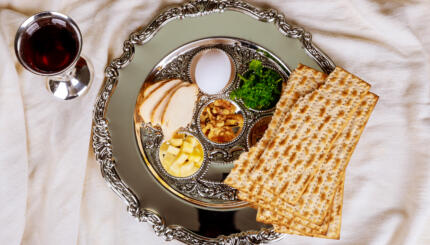When is Passover?
Passover 2012 begins on Friday, April 6, at sunset, and ends the night of Saturday, April 14.
What is Passover?
Passover is also known as the Holiday of Matzah and the Holiday of Our Freedom. It commemorates the Exodus of the Israelites from Egypt and the freedom from hundreds of years of slavery.
The Seder
The central observance of Passover is the seder, a meal with fourteen steps that symbolizes the Exodus from Egypt. For more information about setting  up a seder, click on the picture to your left. The practices of the meal are outlined in a special book called a haggadah. Several of the items needed are placed on a seder plate. Over the course of the meal, we drink four cups of wine, eat matzah and bitter herbs, and sing songs and recite prayers of freedom.
up a seder, click on the picture to your left. The practices of the meal are outlined in a special book called a haggadah. Several of the items needed are placed on a seder plate. Over the course of the meal, we drink four cups of wine, eat matzah and bitter herbs, and sing songs and recite prayers of freedom.
Practices
Although many people eat matzah the entire week, Jews are only traditionally obligated to eat matzah during the seder. Because of the dietary restrictions on bread, there are many special Passover recipes. The first two days and last two days are regarded as holidays by Conservative and Orthodox Jews (in Reform Judaism, only the first and seventh days are celebrated as a holiday). Special prayers, such as Hallel, are said. And, starting on the second night, the omer is counted.
With your help, My Jewish Learning can provide endless opportunities for learning, connection and discovery.
In general, despite the negative associations sometimes associated with matzah, Passover is regarded as a joyous holiday–we are celebrating leaving slavery, after all! Passover is a time to do joyous activities and celebrate with one’s family and friends. And it also commemorates the beginning of spring, so Passover can be a time to do outdoor activities and get outside.


